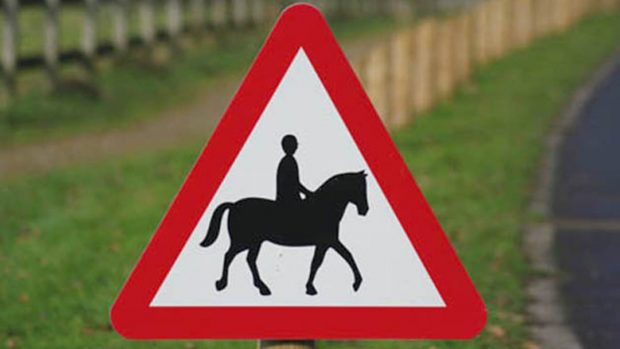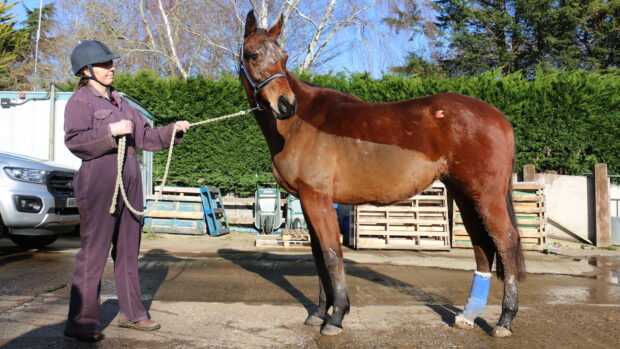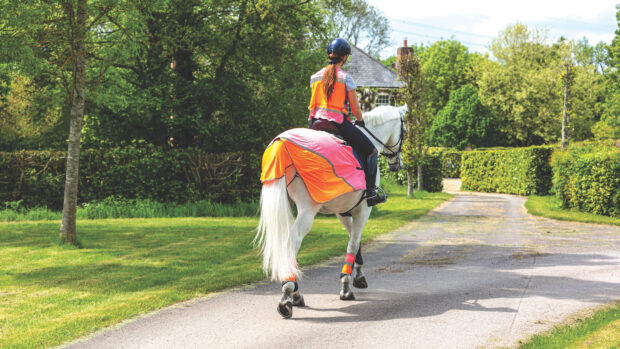A breeder who has lost seven foals in the last year has spoken up about the “living hell” of an equine herpes virus (EHV) abortion storm in hopes it may prevent more deaths.
Vets have confirmed that EHV was responsible for the deaths of foals this year at MFS Studfarm. Caroline Ironside, who owns and runs the Scottish stud with her husband Gordon, told H&H that in 25 years of breeding, she had experienced nothing like the past few months.
“It’s been horrific, emotional, traumatising,” she said. “I wouldn’t wish this on the worst person in the world.”
The stud was expecting nine foals this year but lost two pregnant mares last autumn. Then, when Storm Arwen hit in late November, all hell broke loose.
“We had a horrific time,” Caroline said. “Two barns were demolished, three roofs lost, there was debris flying everywhere. Some of the mares had roofs in their stables and we managed to move some youngsters out of one before the whole thing collapsed. We were concerned about the effects of stress on the mares but nothing happened and we thought we’d weathered the storm.”
In January, the Ironsides’ jumping mare MFS Corina Bella aborted a filly. A post-mortem showed a twisted umbilical cord had caused the foal’s death, so it could not have been prevented.
But in March, having shown no signs of impending labour, Elegan Zitchy was found in her stable with a foal who was barely alive.
“By the time the vet got there, the foal had died,” Caroline said. “We blamed ourselves for not being there.”
But a couple of weeks later, a filly born to Dauphine B also died in her owners’ arms.
“It’s horrific because some of the foals are born dead and others are alive but the virus attacks their lungs so they’re born gasping for breath,” Caroline said. “And it doesn’t happen fast; it’s just horrific.”
As this was so similar to the previous foal, the filly was sent for a post mortem, which confirmed EHV.
“As soon as we knew, the biosecurity kicked in,” Caroline said. “If we’d been a livery or competition yard, we’d have gone public then, and shut down, but there was no impact for any other venues or owners so we just did everything we could. We disinfected everything, staff were all dealing with different barns and different horses, in different clothes; you name it. We vaccinated everything, thinking it might be too little, too late, but we tried to cover all bases.”
Caroline explained that in previous years, when mares were coming and going from the stud, she vaccinated her mares against EHV. But as the stud is now a closed herd, with no horses coming in to bring the virus, and having consulted her vet, she had not vaccinated.
But she has since learned that the virus can lie dormant in horses for years. Vets believe the stress caused by the storm was enough to activate the virus, which could be then spread to other horses.
In early April, a filly born to Lady Fabienne died 24 hours later and on 18 April, Harmony gave birth to a dead foal.
“It got so bad, I even asked our vets if it was not worth us aborting the remaining two pregnancies,” Caroline said. “The thought of going through all this another two times just filled me with dread and anxiety, as this silent killer waits until the mare is almost near foaling when it strikes. You just get over the mental torture of one loss and then it hits you again.”
Caroline added that she is grateful the vets advised against this because, on 30 May, there came a “ray of light”. MFS Dolce De Haar gave birth to a colt foal, named Sunny Jim (pictured), who is thriving.
“There seems to be no rhyme or reason for the whole thing, or why this one has survived,” Caroline said, adding that it may be owing to the fact Dolce was less far along in her pregnancy than the mares who foaled earlier, so the vaccine may have had some effect.
“It’s so difficult to look at all our pastures and see mares with no foals, but we are feeling blessed that we have a foal to bring some light to the darkness of the last seven months.”
Caroline, who still has one mare due to foal next month, shared her story in hopes of raising awareness of the devastating effects of EHV in pregnant mares.
“I thought do I or do I not go public but I wanted to be honest with people,” she said. “I’ve since heard from an amazing number of breeders in the UK who have had similar; most either hadn’t vaccinated or vets weren’t doing vaccinations because of Covid. One breeder said they don’t vaccinate but will definitely consider it now. The vet said our horses will have antibodies for the next year but we’re vaccinating everything now.”
A post Caroline wrote on Facebook about the issue has been shared almost 1,000 times, all over the world.
“I’ve been breeding 25 years and this is the most horrific thing ever,” she said. “We’ve had bad times but nothing compared to what we’ve gone through this year, and if I can spread the word, and stop someone else going through this, I’m all for it.
“I’ve had people in touch saying they didn’t vaccinate because they’ve got closed herds, and to say thank you. Vaccination is expensive, but it’s nothing compared to losing a foal.”
You might also be interested in:

Horse traceability is key as competition restarts after EHV-1 outbreak *H&H Plus*

Mandatory equine herpes vaccinations for sport horses under consideration

Subscribe to Horse & Hound magazine today – and enjoy unlimited website access all year round
Horse & Hound magazine, out every Thursday, is packed with all the latest news and reports, as well as interviews, specials, nostalgia, vet and training advice. Find how you can enjoy the magazine delivered to your door every week, plus options to upgrade your subscription to access our online service that brings you breaking news and reports as well as other benefits.





